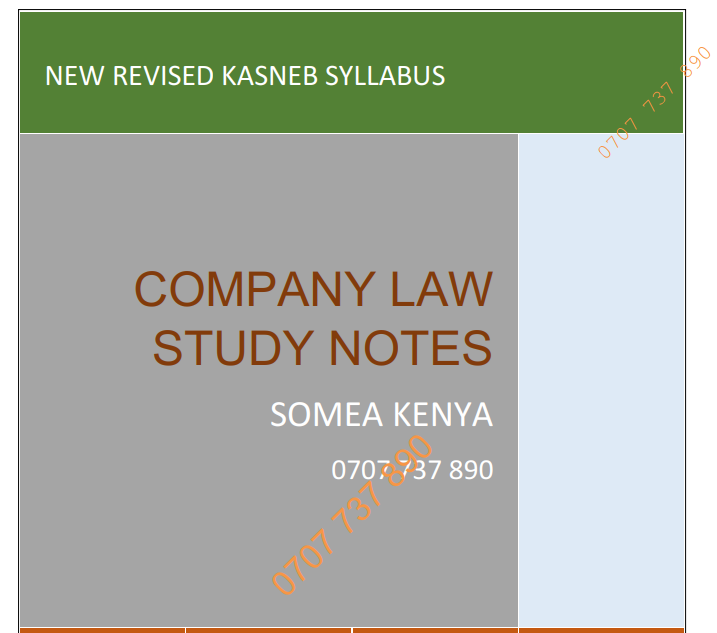
SomeaKenya provides Updated and Revised notes for the current CPA syllabus. Revision kits (Past papers with answers) are also available to help you with revision of the upcoming exams. You can get these materials in Hardcopies (Printed and Binded) and also available in Softcopy form when you subscribe on mobile or Desktop/Laptop someakenya Application. (Note: Softcopies are not Printable and can only be read using android phones) Click here to download SOMEAKENYA APP from Google Playstore.
Full Access to these notes/Kit on Desktop/Laptop via https://desktop.someakenya.co.ke
Or through Our Mobile App
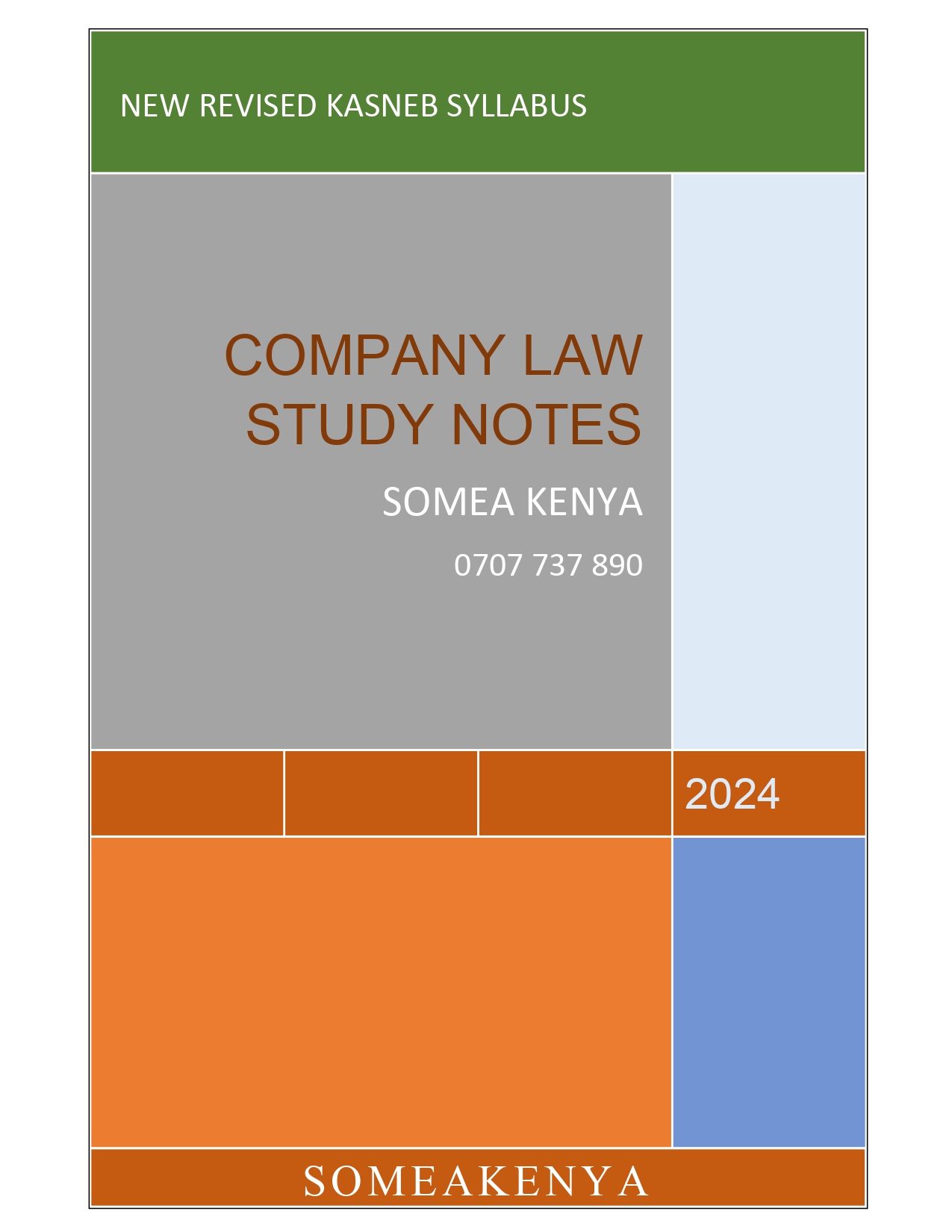
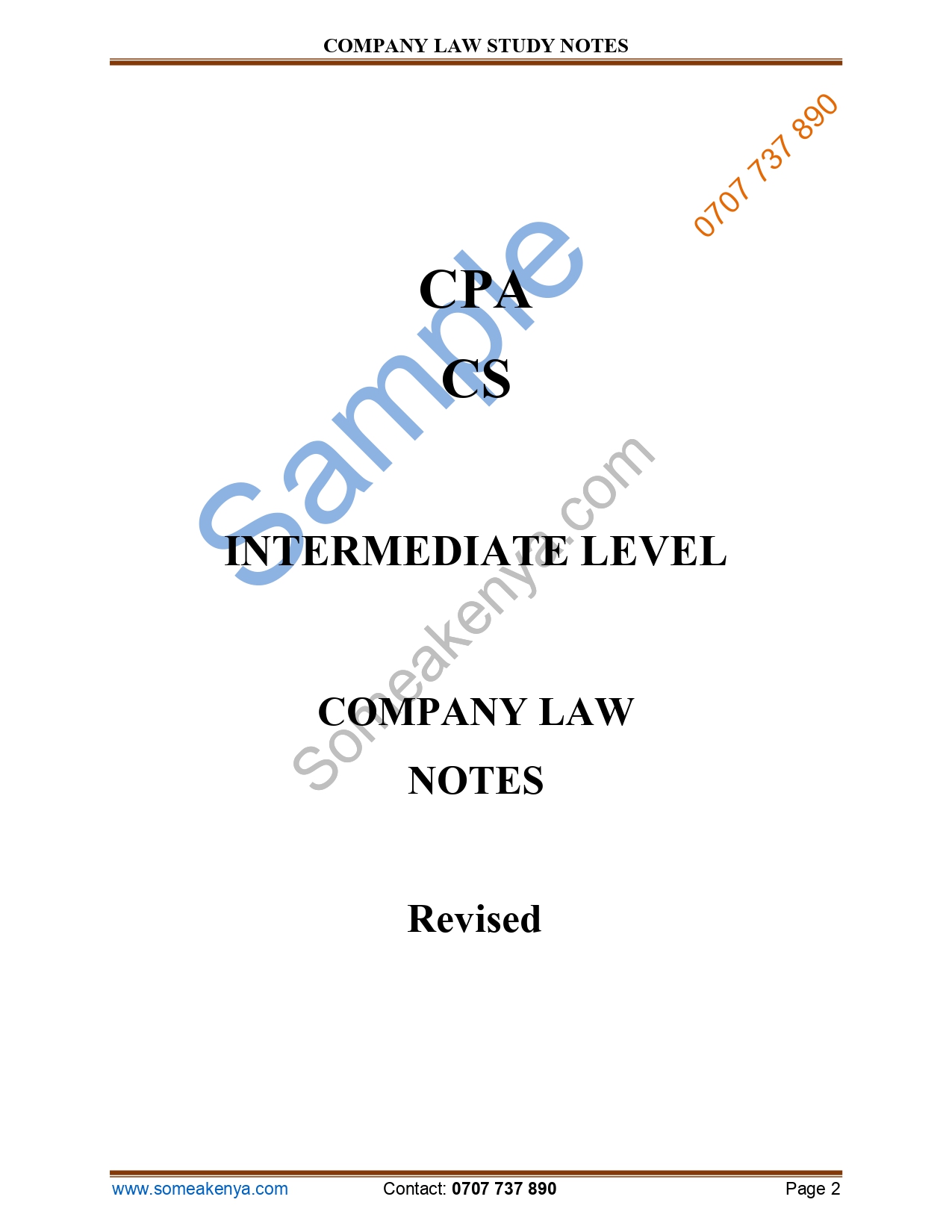


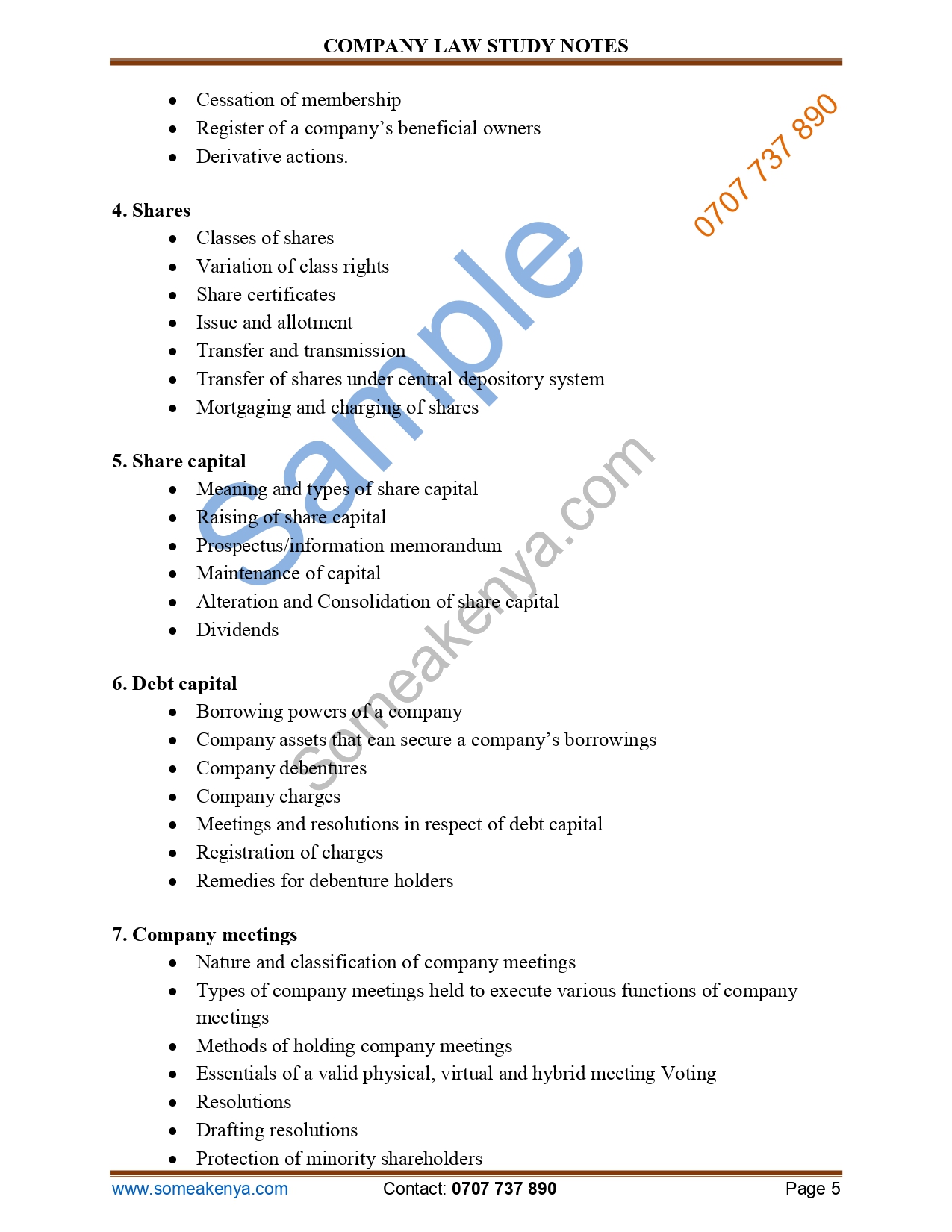


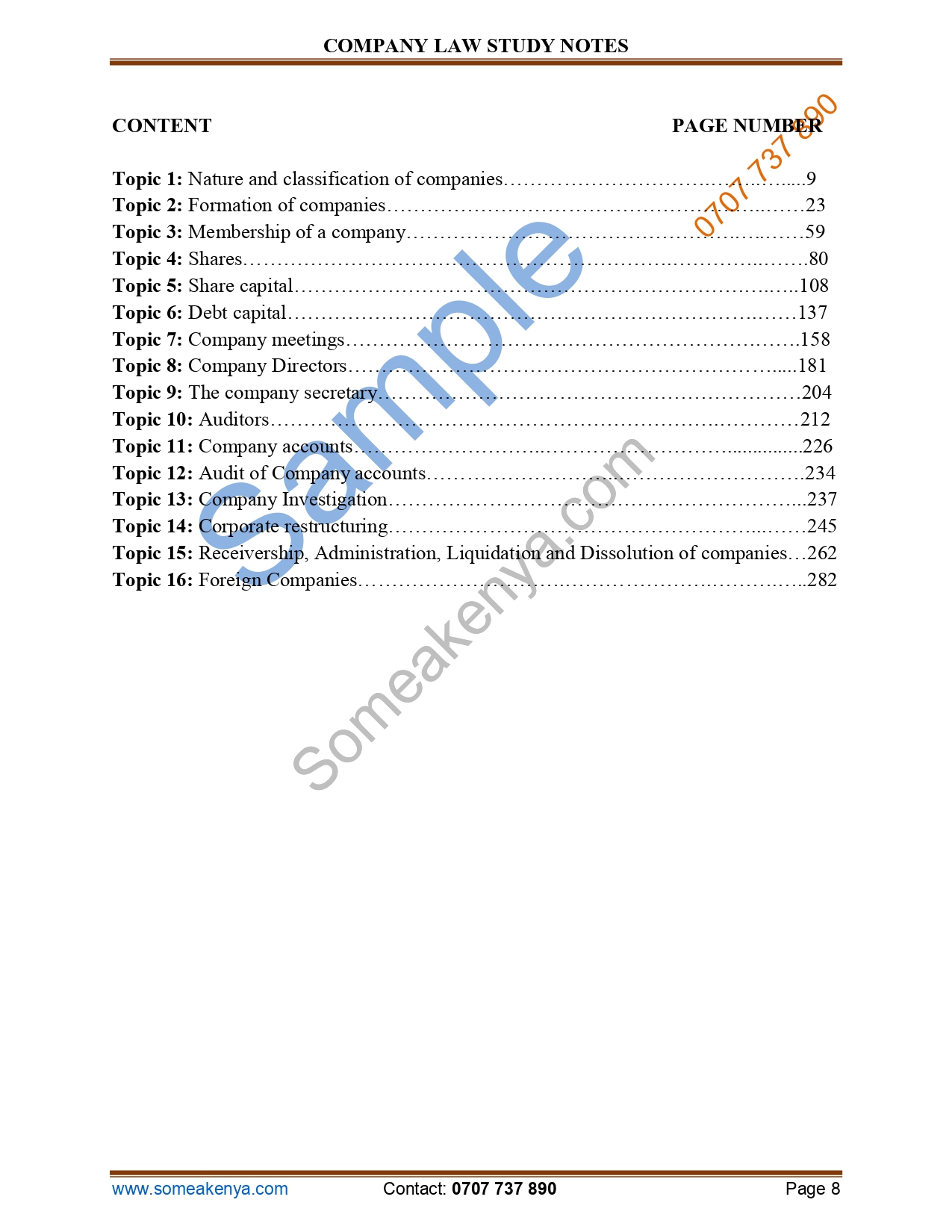
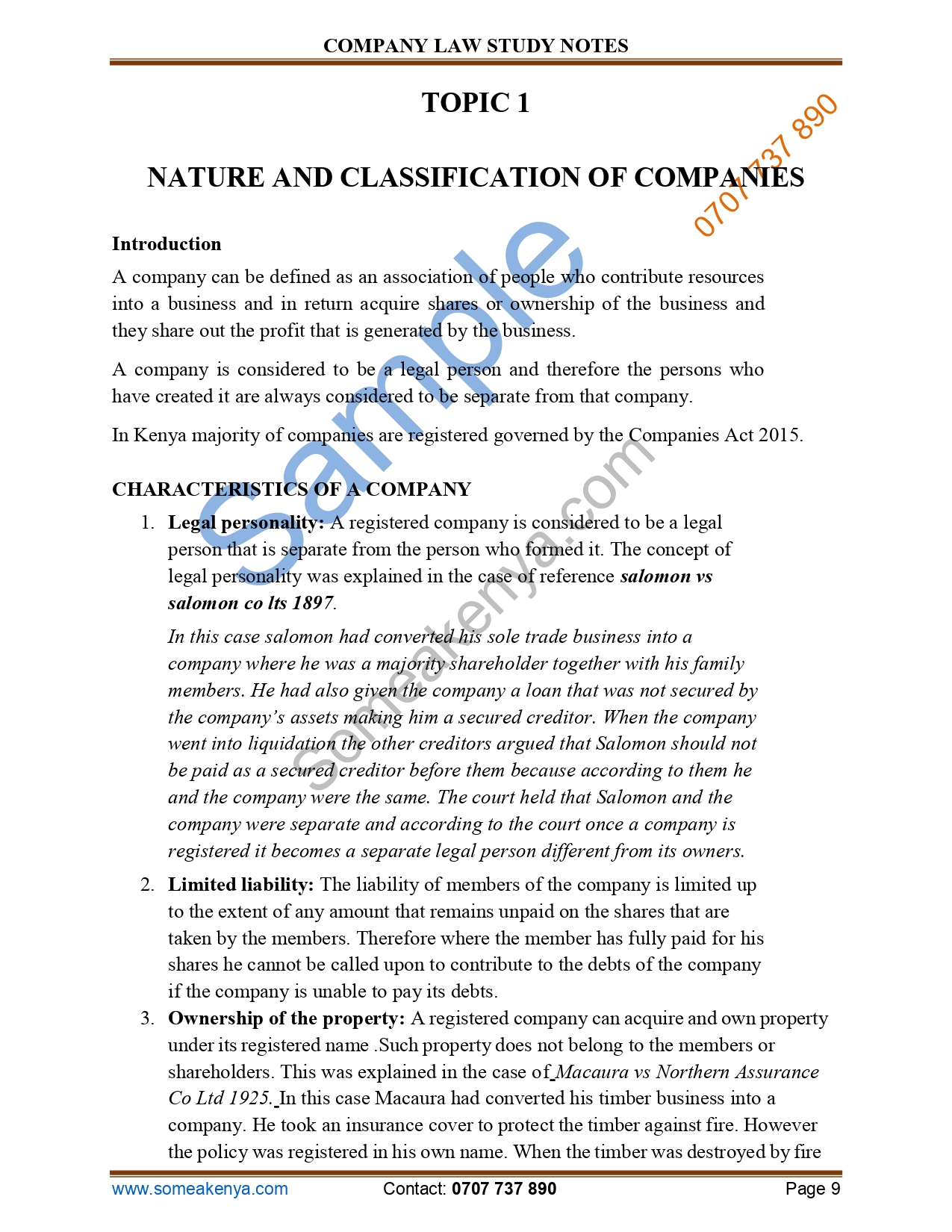


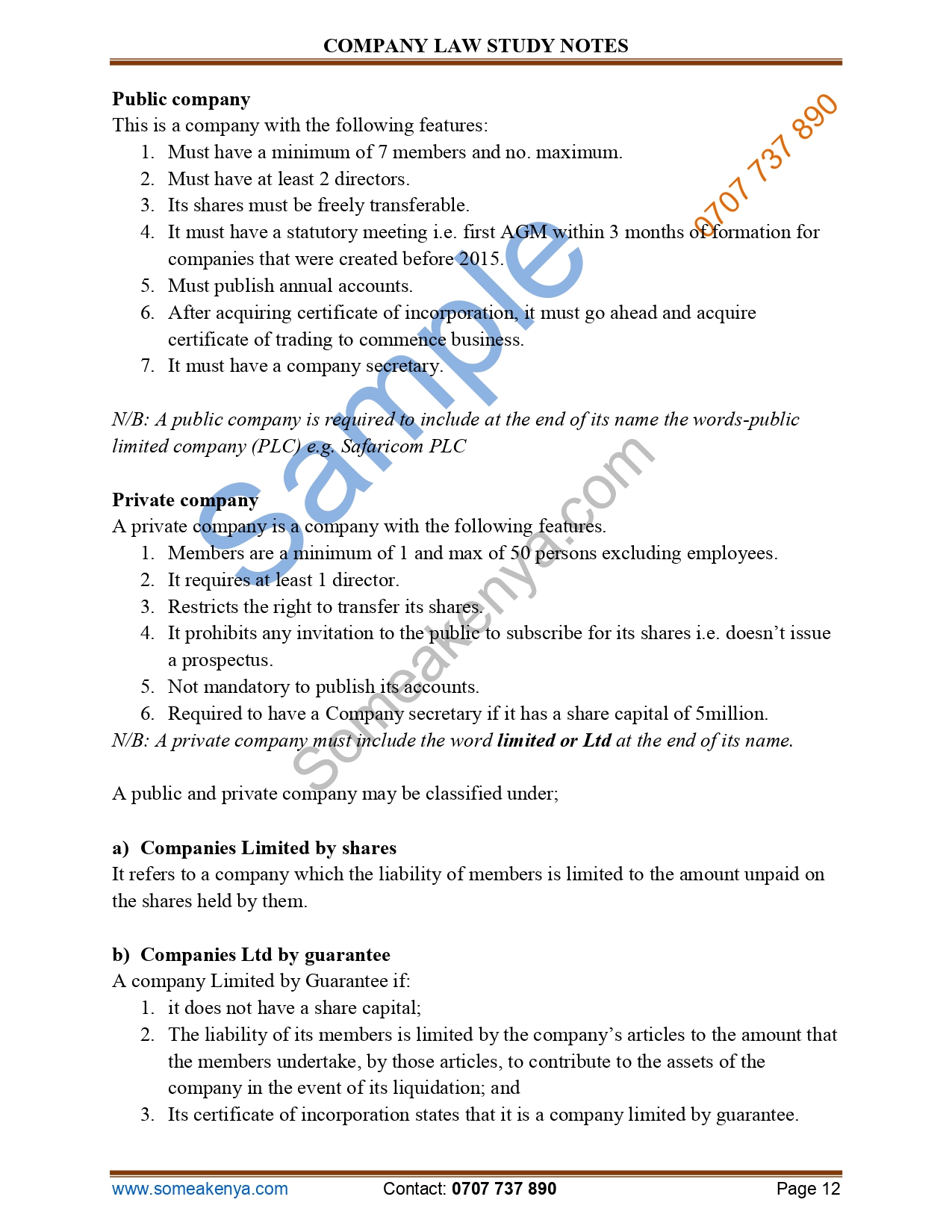



Full Access to these notes/Kit on Desktop/Laptop via https://desktop.someakenya.co.ke
Or through Our Mobile App
Topics covered
CONTENT
- Nature and classification of companies
- Nature and characteristics of a company
- Types of companies
- Principle of legal personality and veil of incorporation
- Distinction between companies and other forms of business associations sole proprietorships, partnerships and cooperative societies.
- Formation of companies
- Promoters and pre-incorporation contracts and deeds.
- Process and drafting documents required to form a company.
- Rules relating to company names
- Memorandum and articles of association
- Certificate of incorporation
- Effects of incorporation
- Execution of a company’s documents
- Alteration of status of companies
- Membership of a company
- Acquisition of membership
- Register of members
- Rights and liabilities of members
- Cessation of membership
- Register of a company’s beneficial owners
- Derivative actions.
- Shares
- Classes of shares
- Variation of class rights
- Share certificates
- Issue and allotment
- Transfer and transmission
- Transfer of shares under central depository system
- Mortgaging and charging of shares
- Share capital
- Meaning and types of share capital
- Raising of share capital
- Prospectus/information memorandum
- Maintenance of capital
- Alteration and Consolidation of share capital
- Dividends
- Debt capital
- Borrowing powers of a company
- Company assets that can secure a company’s borrowings
- Company debentures
- Company charges
- Meetings and resolutions in respect of debt capital
- Registration of charges
- Remedies for debenture holders
- Company meetings
- Nature and classification of company meetings
- Types of company meetings held to execute various functions of company meetings
- Methods of holding company meetings
- Essentials of a valid physical, virtual and hybrid meeting Voting
- Resolutions
- Drafting resolutions
- Protection of minority shareholders
- Company Directors
- Qualifications, appointment and disqualification
- Powers and duties of directors
- Removal and vacation of office
- Register of directors
- Remuneration of directors
- Loans to directors
- Compensation for loss of office
- Disclosure of director’s interest in contracts
- The rule in Turquand’s case/Indoor Management rule
- Insider dealing
- The Company Secretary
- Qualification, appointment and removal
- Powers and duties of the Company Secretary
- Liability of the Company Secretary
- Register of Secretaries
- Auditors
- Qualification, appointment and removal
- Remuneration of auditors
- Powers and duties
- Rights and liabilities
- Company accounts
- Books of accounts
- Form and content of accounts
- Group accounts
- Director’s report
- Audit of Company Accounts
- Auditor’s report
- Annual returns
- Company Investigation
- Investigation of company affairs
- Appointment and powers of inspectors
- Inspector’s report
- Corporate restructuring
- Need for restructuring
- Mergers
- Post – merger reorganisation of a company’s share capital
- Takeovers and acquisitions
- Mergers and divisions of public companies
- Compromises, arrangements, reconstructions and amalgamations
- Receivership, Administration, Liquidation and Dissolution of companies
- Meaning of receivership, administration and dissolution
- Appointment and vacation of office by the Official Receiver
- Powers and duties of a receiver
- Termination of receivership
- Appointment of an administrator
- Functions and powers of an administrator
- Process of administration
- Termination of appointment and replacement of administrators
- Company voluntary arrangements
- Meaning of liquidation
- Types of liquidation
- Appointment, powers and duties of liquidators
- Discharge of liquidators
- Distribution of assets and dissolution of companies
- Foreign Companies
- Process of registering a company
- Certificate of registration
- Power to hold land
- Registration of charges
- Accounts of foreign companies
- Service of process and notices on foreign companies
- Returns
- Penalties
- Cessation of business
TOPIC 1
NATURE AND CLASSIFICATION OF COMPANIES
Introduction
A company can be defined as an association of people who contribute resources into a business and in return acquire shares or ownership of the business and they share out the profit that is generated by the business.
A company is considered to be a legal person and therefore the persons who have created it are always considered to be separate from that company.
In Kenya majority of companies are registered governed by the Companies Act 2015.
CHARACTERISTICS OF A COMPANY
1. Legal personality: A registered company is considered to be a legal person that is separate from the person who formed it. The concept of legal personality was explained in the case of reference salomon vs salomon co lts 1897.
In this case salomon had converted his sole trade business into a company where he was a majority shareholder together with his family members. He had also given the company a loan that was not secured by the company’s assets making him a secured creditor. When the company went into liquidation the other creditors argued that Salomon should not be paid as a secured creditor before them because according to them he and the company were the same. The court held that Salomon and the company were separate and according to the court once a company is registered it becomes a separate legal person different from its owners.
2. Limited liability: The liability of members of the company is limited up to the extent of any amount that remains unpaid on the shares that are taken by the members. Therefore where the member has fully paid for his shares he cannot be called upon to contribute to the debts of the company if the company is unable to pay its debts.
3. Ownership of the property: A registered company can acquire and own property under its registered name .Such property does not belong to the members or shareholders. This was explained in the case of Macaura vs Northern Assurance Co Ltd 1925. In this case Macaura had converted his timber business into a company. He took an insurance cover to protect the timber against fire. However the policy was registered in his own name. When the timber was destroyed by fire Macaura made claim for compensation but the insurance company refused arguing that Macaura had no insurable interest on the timber .When he sued the company the court held that Macaura could not be compensated because the property he insured belonged to the company. The court explained that companies properties do not belong to the members
4. Capacity to Contract: A registered company can enter into legally binding contracts with other parties in order to pursue its objectives.
5. Capacity to sue or be sued: a registered company can sue another party to protect its interest and can also be sued if it fails to fulfill its obligations.
6. Perpetual succession: The Company’s life is not affected by the death of its members .if a member dies the company continues to exist.
7. Common Seal: A registered company can acquire a common seal that can be used as an official signature of the company.
8. Borrowing Power: A registered company can borrow finances from lenders to finance its operations.
9. Management: Registered companies are usually managed by trained personnel that are able to provide professional services to the company.
10. Transfer of Shares: Shares of a registered company can be transferred from one member to another.
Disadvantages of a company
1. It’s expensive: Registration of a company involves costs, including legal fees.
2. Complicated procedures: A lot of procedures are involved in formation and running the company.
3. Publicity/lack of confidentiality: A company is subject to undue publicity i.e. such documents must be delivered to the registrar and are open to public scrutiny.
4. High taxation: companies pay corporation tax at 30% for local companies and 37.5% for foreign companies which is relatively high compared to an income tax paid by individual partners.
5. Participation in the management: shareholders other than those who are directors are not involved in the day to day management of the company
6. Doctrine of ultra vires: Any act done beyond articles of association is null and void i.e. beyond powers.
TYPES OF COMPANIES
1. Chartered corporations
– These are corporations created by a charter that is granted by the president.
– Only private universities are created through charter in Kenya.
– Under university’s act, the president is empowered to grant a charter to any private university intending to be set up to benefit the country.
– The charter must set out the name, membership and also the powers and functions of the universities e.g. mount Kenya University.
2. Statutory corporations
– They are created by an Act of parliament or an order of the president in accordance with the state corporations Act.
– These are government corporations especially parastatals.
– The Act creating the corporation gives it a name, management structure and also prescribes the objects i.e. Kenya pipeline, Kasneb, NSSF, NHIF, Central Bank etc.
3. Registered corporations
– Are created in accordance with the provisions of companies Act.
– Certain documents must be delivered to the registrar of companies for registration i.e. MOA and AOA. Examples include public and private companies.
Public company
This is a company with the following features:
1. Must have a minimum of 7 members and no. maximum.
2. Must have at least 2 directors.
3. Its shares must be freely transferable.
4. It must have a statutory meeting i.e. first AGM within 3 months of formation for companies that were created before 2015.
5. Must publish annual accounts.
6. After acquiring certificate of incorporation, it must go ahead and acquire certificate of trading to commence business.
7. It must have a company secretary.
N/B: A public company is required to include at the end of its name the words-public limited company (PLC) e.g. Safaricom PLC
Private company
A private company is a company with the following features.
1. Members are a minimum of 1 and max of 50 persons excluding employees.
2. It requires at least 1 director.
3. Restricts the right to transfer its shares.
4. It prohibits any invitation to the public to subscribe for its shares i.e. doesn’t issue a prospectus.
5. Not mandatory to publish its accounts.
6. Required to have a Company secretary if it has a share capital of 5million.
N/B: A private company must include the word limited or Ltd at the end of its name.
A public and private company may be classified under;
a) Companies Limited by shares
It refers to a company which the liability of members is limited to the amount unpaid on the shares held by them.
b) Companies Ltd by guarantee
A company Limited by Guarantee if:
1. it does not have a share capital;
2. The liability of its members is limited by the company’s articles to the amount that the members undertake, by those articles, to contribute to the assets of the company in the event of its liquidation; and
3. Its certificate of incorporation states that it is a company limited by guarantee.
Companies Limited by Guarantee in Kenya are mainly registered for the purpose of operating non-profit organizations that require a legal personality.
c) Unlimited companies
These are companies where member’s liability is unlimited.
Such members may lose their private assets, in case the company is declared insolvent.
DISTINCTION BETWEEN COMPANIES AND OTHER FORMS OF BUSINESS ASSOCIATIONS SOLE PROPRIETORSHIPS, PARTNERSHIPS AND COOPERATIVE SOCIETIES
Difference between Public Company and private company
Public company Private company
Membership Minimum of 7 and no maximum Minimum of 1 and maximum of 50
Prospectus Can issue a prospectus Cannot issue a prospectus
Director At least 2 directors At least 1 director
Transfer of shares
Shares are freely transferable Restricts transfer of shares to members only
Commencement of business
Can only commence business after certificate of trading is issued Can commence business
after certificate of Incorporation is issued
Publication of accounts Must publish its account No requirement to publish accounts
Difference between Registered Company and statutory company
Registered company Statutory company
Incorporated under the provisions of the Company Act Created by an Act of parliament
Governed by directors Owned by the government
Can only engage in transactions stipulated in memorandum and articles of association Can only engage in transactions set by the statute.
Difference between Companies and private Partnership
COMPANIES PARTNERSHIP
LEGAL PERSONALITY Is a legal person distinct from its members Is not a legal person in eyes of law
MEMBERSHIP
1-50 members for private companies and minimum of 7 and no maximum for public companies. Requires a min of 2-20 persons.
REGISTRATION
Registered under Companies Act Registered under partnership Act
CAPACITY TO OWN PROPERTY Has capacity to own property under its own name. Property is jointly owned by partners
MANAGEMENT Managed by directors. Managed by partners
MEETINGS
A legal requirement to hold AGM. It is not a legal requirement.
PERPETUAL SUCCESSION Has perpetual succession.
Death, bankruptcy or insanity can lead to dissolution of partnership
DOCTRINES OF ULTRA VIRES
Ultra vires means beyond power. A company is bound by this doctrine since any act beyond AOA is beyond power. Not bound by doctrine of ultra vires
AUDITORS Must appoint auditors to audit books of accounts. Is not a legal requirement.
LIABILITY Limited by shares or guarantee Members liability is unlimited i.e. partners may lose personal assets in case of insolvency.
There are two types of corporations mainly:
i) Corporation sole
ii) Corporation aggregate
1. Corporation sole
This is a legally established office distinct from the owner and can only be occupied by one person after which he is succeeded by another e.g. the president’s office, chief justice office etc.
It has the following features
1. It is a legal person with limited liability.
2. It can own property.
3. It can enter into a contract.
4. It has perpetual succession.
5. It can sue or be sued.
2. Corporation aggregate
– This is a legal entity formed by two or more persons for a lawful purpose.
It has the following features:
1. It has independent legal existence with limited liability.
2. It has perpetual succession.
3. Capacity to contract.
4. It can own property.
5. It can sue or be sued.
Examples of corporation aggregate
1. Chartered corporations.
2. Statutory corporations.
3. Registered corporations or companies.
OTHER TYPES OF COMPANIES
1. Holding and subsidiary company
Holding is a company which controls the management of another company known as the subsidiary.
Subsidiary is a company controlled in terms of management by another company known as parent company.
A company is deemed to be a holding company of a subsidiary company if:
i) The holding company controls the majority of the BOD i.e. controls the management of another company.
ii) If the holding company owns more than half in nominal value of equity share capital of subsidiary i.e. controls more than 50% of share capital of subsidiary company.
iii) If a subsidiary of another company which is that other company’s subsidiary.
2. Foreign company
This is a company incorporated outside Kenya but having a place of business in Kenya.
Ordinarily these companies are known as multi-nationals because they operate in many countries outside their country of origin.
Unincorporated association
This is a group of people who have come together to promote/pursue a common purpose but without going through the various legal procedures of registering a company. These associations are not body corporate.
They include:
1. Trade union
2. Societies
3. Partnerships
4. Staff union
1. Trade unions
Are organisations whose primary objective is to regulate the relationship between employer and employees e.g. COTU, KNUT etc. A registered trade union has special privileges
i) It may sue/be sued under its registered name.
ii) Its offices are immune from civil prosecutions for acts committed in furtherance of a trade dispute.
iii) All properties of trade unions are vested on trustees for benefits of its members.
2. Co-op societies
It is basically an independent organisation of people who have come together voluntarily to meet a common economic, social or cultural needs.
Cooperative principles
1. Voluntary and open membership
2. Democratic membership control i.e. one man one vote
3. Economic participation by members.
4. Autonomy and independence
5. Education, trading and information.
6. Cooperation among cooperatives.
7. Concern for the community in general.
Advantages of co-operatives
1. Mobilization of savings
2. Marketing of agricultural produce
3. Provision of credit to members.
4. Creating employment both directly and indirectly
5. Training, education and information to members. E.g. technology
6. Collection, transportation and process of agricultural produce
Types of cooperative societies
1. Primary Cooperatives: This is one whose membership is restricted to individual members.
2. Co-operative union: This is a co-op society whose membership is restricted to primary societies i.e. KUSCO
3. Apex: it is a co-op society whose membership is restricted to co-op unions.
Difference between a cooperative society and a company
Co-op society Company
Created and regulated by societies act. Created under companies act.
Formed by at least 10 members. At least 1 member for private companies 7 for public companies
It is not a legal person. It is a legal person
Main purpose is to serve its members. Main work is to serve the public
Managed by management committee. Managed by board of directors.
Registered by commissioner of co-operative development. Registered by the registrar of the company.
It is democratic as members have equal voting powers. Members voting is based on number of shares held
8. Members have unlimited liability. Members have limited liability either by shares or guarantee.
PRINCIPLE OF LEGAL PERSONALITY/VEIL OF INCORPORATION
Veil of incorporation refers to the situation where the real identity of the owners of the company is hidden by the concept of legal personality
As a result the company is able to deal with parties in its own identity hiding the real identity of the shareholders or people behind that company.
Exceptions to Concept of the Legal Personality
A company is a legal person and it is separate from its members. This principle is regarded as a curtain/veil/shield between the company and its members.
There are some exceptional instances where a company and members may be treated as one and the same thing.
These instances are known as lifting the veil of incorporation or exceptions to the case of Salomon vs. Salommon
However there are certain circumstances when the veil of incorporation can be lifted or The concept of legal personality is disregarded in order to know the real identity of the persons behind that company. This circumstances can be classified into two categories as follows
i) Lifting the veil by the statute/Act of parliament.
ii) Lifting the veil by court.
Lifting the Veil by Act of Parliament/Legislation/ Company Act
These are circumstances when provisions of Company Act are not adhered to. They include:
1. Reduction in number of members has fallen below statutory minimum
– Where the membership of a company falls below the statutory requirement and members do business for more than 6 months
2. Non-publication/mis-description of companies name
– Every company is required by the Company Act to publish its name in legible roman letters on all official publications e.g. cheques, invoices, bills exchange. Failure to comply with those provision may lead to lifting of the corporate veil.
3. Group accounts
– The holding company is obligated to incorporate into its balance sheet the assets and liabilities of the subsidiary as it was as their own asset and liabilities.
– This is also regarded as lifting the veil of incorporation.
4. Investigation of the companies affair by an inspector appointed by court
– Company Act requires an inspector appointed by the court to investigate company’s affairs. This investigation may go beyond and investigate the company’s members.
5. Investigation of companies membership by inspector appointed by registrar of company
– The law empowers the registrar to appoint an inspector to investigate the membership of any company for the purpose of determining the true person who are financially interested in the success of the company.
6. Take-over bid
– A scheme of take-over bid requires that 90% of the shareholders of the transferor to approve.
– The dissenting and minority shareholders may apply to the court within one month to restrain compulsory acquisition of their shares.
– The court may be in appropriate situation lift the veil of incorporation and investigate members in protecting interest of minority.
7. Fraudulent trading
– The law requires that if it appears that any business of the company has been carried on with the intention to defraud creditors during winding up, the court may lift the veil of incorporation and hold those involved personally liable.
Lifting the veil By Court
1. Determination of character
– This is in order to determine whether a company is an enemy in times of war i.e. a company whose members behind it are foreigners who come from a country which at war with Kenya is also declared an enemy to Kenya.
2. The company is a sham
– This is where the company is used to carry out illegal or improper activities or to perpetuate fraud, corruption, crime, sexual immorality etc.
3. Where the company is acting as the agent of the shareholder
– The company is not in law an agent of the subscribers. If the court holds that a company acted in as particular instance as an agent of its shareholders, the veil of incorporation would be lifted.
4. Protection of revenue
– The court would disregard the corporate entity where its used for tax evasion or to circumvent tax obligation
5. Prevent deliberate evasion of contractual obligation
The veil is lifted where members are using the company to evade contractual obligation.
PARTNERSHIP
It is a relationship which exists between persons carrying out a business with a view of making profit.
Duties of partners
1. Contribute capital.
2. To be accountable and not make secret profit.
3. To be honest and have full disclosure.
4. Not to compete with the firm.
5. Duty to share loss.
Rights of a partner
1. To participate in decision making of the firm.
2. To participate in sharing profit.
3. To be informed in case of admission of a new partner.
4. To inspect or access partnership records.
Dissolution of partnership
– It may be dissolved under the grounds:
i) By court order
ii) Without court order
1. By court order
– A partner in a partnership may apply to the court for the dissolution of partnership under the following grounds.
i) Insanity
ii) Permanent incapacity
iii) Pre-judicial conduct/unfairness.
iv) Persistent breach of partnership agreement.
v) Continuous carrying of business at a loss
vi) Just and equitable grounds i.e. continuous disagreement.
2. Without court order
i) Lapse of time.
ii) Performance i.e. Completion of the objectives intended.
iii) By notice of the partners.
iv) Through bankruptcy of a partner.
v) Death of a partner.
vi) Insanity.
REVISION QUESTIONS
QUESTION 1
Distinguish between a company limited by shares and a company limited guarantee.
QUESTION 2
a) Outline the circumstances under which a company is deemed to be a subsidiary of another company.
b) Upendo Company was registered five years ago as an unlimited company. Its main object was to offer humanitarian services to the less privileged members of the society. The company has since grown into a large undertaking. The members wish to convert the company into a limited company and seek your legal advise
Advice the members on the following;
i. The procedure to be followed in converting the company from an unlimited company to a limited company.
ii. The legal effect of such a conversion on the right and liabilities of the members.
QUESTION 3
Kimoli and Anjere wish to venture into business. However, they are not sure of whether to trade as a partnership or a private Limited company and seek your advice.
Advise them on the disadvantages of trading as a private limited company.
QUESTION 4
Distinguish between a company and a co-operative society.
QUESTION 5
a) Distinguish between a corporation sole and a corporation aggregate
b) Tim and Tom wish to establish a business jointly. However, they are not sure whether to establish a limited liability company or an unlimited liability company; as they know little about these types of companies.
i) Explain to them the differences between a limited company and an unlimited company.
ii) State the provisions of the Companies Act regarding the re-registration of unlimited company as limited.
c) Outline the documents that are normally kept at the registered office of a company
QUESTION 6
Akinyi Mburu and Mrs. Jerotich Simiyu intend to start a business in the tourism industry. Mrs. Mburu considers a partnership to be the best form of business while Mrs. Jerotich prefers a private company.
Advice Mrs. Mburu and Mrs. Simiyu on the following;
a) The advantages of a registered company over a partnership.
b) The advantages of a partnership.
QUESTION 7
a) Explain the advantages of private companies over public companies
b) Outline the formalities and requirements that a private company is allowed to dispense with through an elective resolution.
QUESTION 8
(a) Compare and contrast a corporation created under the Companies Act and a corporation created under an Act of Parliament.
(b) Mr. and Mrs. Matanguta intend to form a limited company known as M and M Hardware Limited. They approach you and seek you advice.
Advise them on the following issues:
(i) What is the meaning of a private limited company according to the Companies Act?
(ii) What are the advantages of forming a private company as opposed to a public company?
(iii) Assuming Mr. and Mrs. Matanguta wish to convert the private company into a public company, what would they be required to do?
please send the notes for CPA INT. LEVEL.
hi. i wanted to order notes via my laptop. is it possible?.